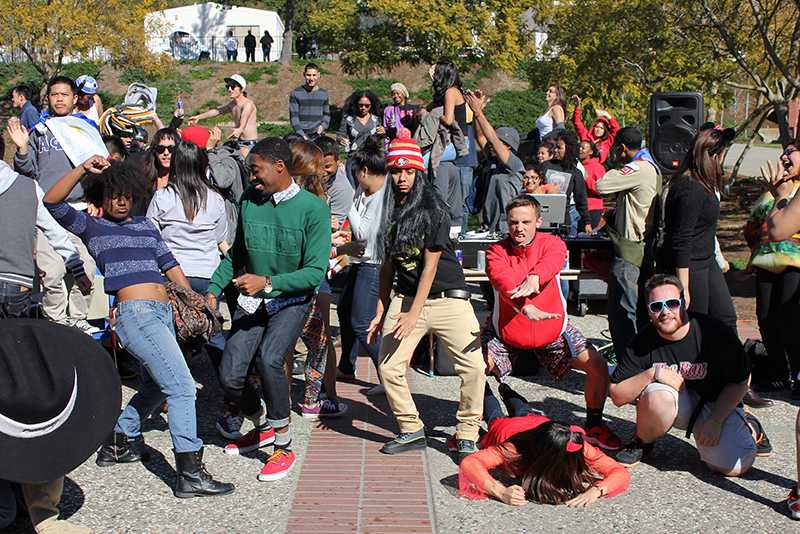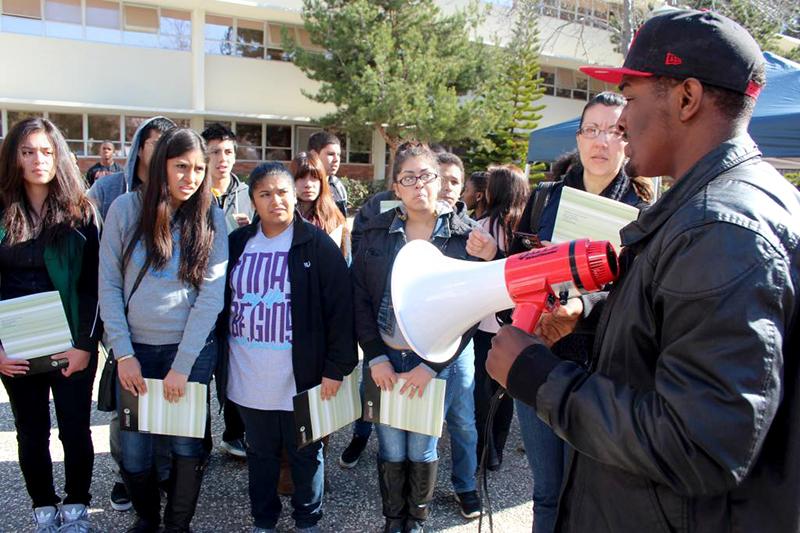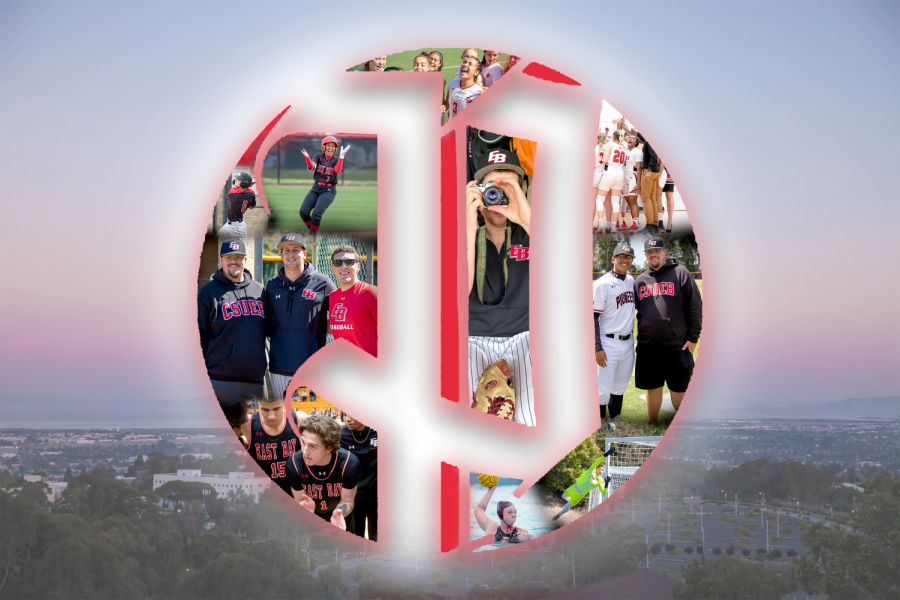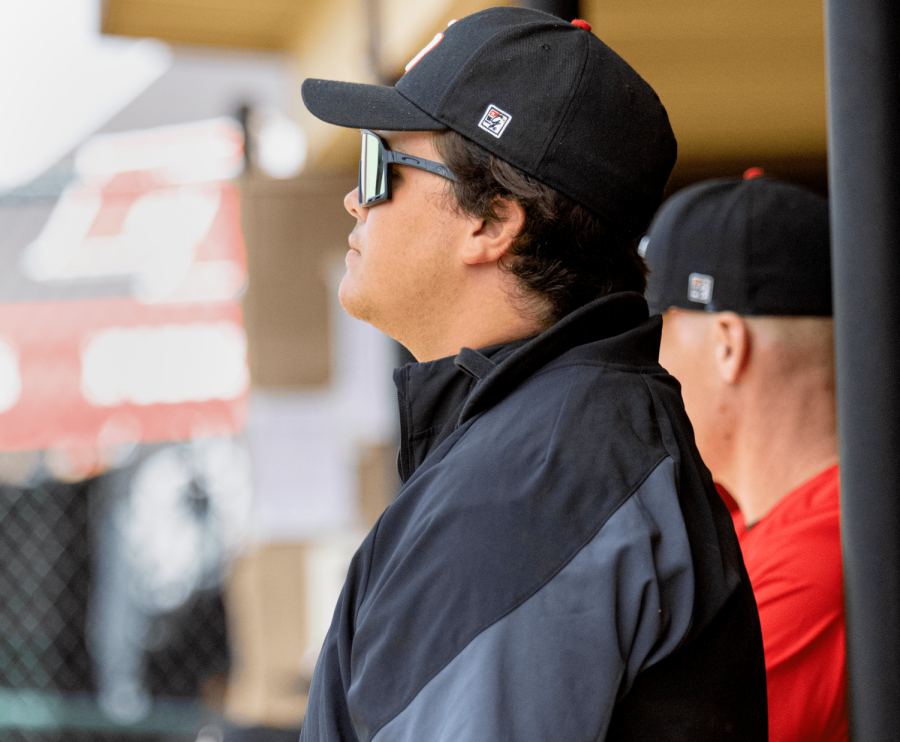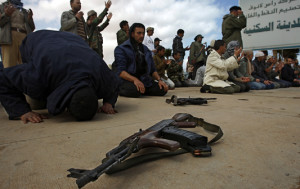
Libya, on the heels of the Tunisian and Egyptian revolutions, finds itself gripped in civil war, pitting the long-suffering Libyan people against pitiless dictator Muammar Qaddafi.
International press coverage from the North African nation has brought us images of Qaddafi loyalists opening fire on unarmed protestors, employing aircraft to bomb rebel-held cities and towns (and killing civilians), and guest workers from neighboring countries attempting to flee the country. Conservative estimates put the death toll at over 1,000 people, and this number is surely to rise as Colonel Qaddafi continues to wage war on the populace.
President Obama and his administration have offered a variety of responses, calling for an end to the violence and demanding Qaddafi step down, while considering a range of military options designed to prevent the further slaughter of the Libyan people by the ruthless regime.
Whatever the course of action the United States and the rest of the world choose to take—and choose they must—the options and their potential consequences must be considered thoughtfully and with a sense of urgency.
The Tunisian and Egyptian revolutions brought down those nations’ respective dictators relatively peacefully, especially when one considers the blood now being shed in the sands of the Maghreb.
Qaddafi and his stooges, having witnessed the toppling of Zine El Abidine Ben Ali and Hosni Mubarak, elected to take up arms against their own people in an attempt to quash the rebellion that threatens their four-decade stranglehold on the country. Despite the Colonel’s penchant for exporting violence—from supporting the Provisional Irish Republican Army to the Moro Islamic Liberation Front in the Philippines—the world has largely turned a blind eye to the “Brother Leader.” Italy and France both maintained lucrative business deals with the Qaddafi government, in no small part due to Libya’s vast oil and natural gas reserves, which have made the Colonel and his family fabulously wealthy.
Formerly in bed with the Soviet Union, hostile to its neighbors Egypt and Chad (both of whom Qaddafi went to war with between the late 1960s through the 1980s) and notorious for the 1988 Pan Am 103 bombing over Lockerbie, Scotland, the world’s shock over Gaddafi’s current atrocities seem outrageously disingenuous. Indeed, the man whom President Ronald Reagan dubbed the “mad dog of the Middle East” has ably demonstrated the depths of said madness through the perpetration of violence against his own people, and, when the opportunity presented itself, against others.
The Libyan Air Force, equipped with French- and Soviet-made fighter jets and helicopters, is currently employed against the rebels, who have dug into key positions in Libya’s cities and oil terminals. While a number of reported incidents of pilots refusing to carry out bombing orders and defecting have emerged, rebels have stepped up their appeals for the U.N. to implement a no-fly zone over the country’s skies to deny Qaddafi the air superiority it can not possibly match.
Indeed, “no-fly zone” is the term garnering the most attention among U.S. politicians and political pundits, as well as the United Nations. By imposing air superiority over Libya, the reasoning holds, the playing field will be leveled.
Senator John Kerry (D-Mass.) says, “The last thing we want to think about is any kind of military intervention,” which has been the general consensus among American politicians, but in his next statement, says he doesn’t “consider the fly zone stepping over that line.” Critics and detractors of that line of thinking point out, rightfully, that the enforcement of a no-fly zone would be just that: military intervention.
Undoubtedly, NATO air power would overwhelm the Libyan Air Force, which is compromised mostly of 1970s, third-generation jet aircraft, but reports that Qaddafi’s anti-aircraft arsenal includes Russian surface-to-air missiles (a significant threat) poses another important question: what would happen should an American or other NATO pilot get shot down and captured?
More importantly, especially in the wake of the deadly strike in Afghanistan that killed nine young boys mistaken as Taliban fighters, are we prepared to deal with the possibility of making another mistake that could cost civilian lives? Given the record of the wars in Afghanistan and Iraq, and our involvement in civilian casualties, the possibility of American forces killing more Muslim civilians adds another element of uncertainty in undertaking any form of intervention.
And, as many critics of intervention of pointed out, what does it say to the world if the United States is involved in another conflict in a third Muslim country?
Other Arab nations have resolved to speak out against Qaddafi and call for action of some kind to be taken in support of the rebels, but are wary of any American involvement. Surely the example of Iraq, where American force took out one dictator—the long and not-so-dearly departed Saddam Hussein—only to find no credible replacement in the wings; the violence that ensued claimed tens of thousands of lives, according to conservative estimates.
The U.S. government is not ignorant of these considerations, and Secretary of State Hillary Clinton has already acknowledged that any use of force must be decided not by the U.S. alone, but with the approval of the U.N. Steps to freeze Qaddafi’s assets and hold him and his stooges responsible for war crimes in the International Criminal Court are encouraging steps, but are unlikely to remove him from office—indeed, he has already declared that he would rather die a “martyr.”
Given the moral equivocation the West has adopted as policy in regard to the Arab world, with all the hobnobbing and glad-handing between Western statesmen and autocrats and tyrants, the tacit dismissal of Qaddafi’s crimes (see: the UK’s release of the Lockerbie bomber under alleged “medical” reasons, or the shameful admittance of Libya to the U.N. Human Rights Council) and the general disregard for North Africa as a strategic interest until last week, it seems morally dubious for the U.S. and its allies to pretend that it has cared about the rights, freedoms and welfare of the Libyan people.
But the complicity the West has displayed in the past needs not to continue necessarily in the form of non-intervention and neutrality, which Christopher Hitchens has astutely identified as a policy in itself, one that “favors the side with biggest arsenal.” Indeed, the world stood by impotently as the Rwandan genocide took place in the 1990s, as well as the massacre of Bosnian Muslims by the Serbs at Srebrenica during the same decade.
At the time of this writing, Qaddafi’s forces began a series of counterattacks on rebel-held areas, employing the full range of its ground and air arsenal, not to mention the 500 or so mercenaries hired to carry out the orders that many Libyan soldiers rejected—to open fire on the Libyan people. The prolonged conflict has, it seems, emboldened Qaddafi, who has cast his opponents as lackeys of “Western colonizers.”
The myriad complexities of the civil war in Libya pose questions about the moral authority of intervention, the proper application, if any, of force and the efficacy of international resolve and outrage at the brutalization of people by a dictator. But as we contemplate our next course of action, far removed from the violence and suffering visited upon by the courageous Libyan people, Qaddafi and his thugs continue their persecution unabated.
Very seldom are there easy answers, and careful deliberation over how best to alleviate the plight of Libyans must be taken. As the hours and days go by, however, the revolution in Libya finds itself in greater danger of being ground into the sands of the desert. Our hearts are with the rebels, as it is with any who are on the side of freedom and liberty.





